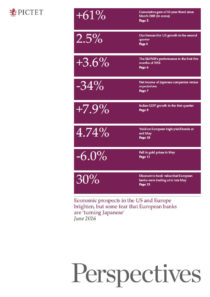Published: 14th June 2016Download issue:Will Knut Wicksell be proved right? The Swede’s theories include the notion that there is a ‘natural’ level of interest rates, consistent with the economy operating at its full potential without overheating. But the actions of central banks have forced interest rates to artificially low levels in recent times, well below their ‘natural’ levels. If nature should reassert its predominance again, so the theory goes, then rates could shoot up, leading to a disruptive rise in long-term interest rates. Or will the ideas of the American Irving Fisher continue to prevail rather than those of Wicksell? Supporters of this view believe it is not central banks that are behind today’s low interest rates, but ultimately the anaemic state of the economy. This being the case, the ‘Fisherians’ argue, rather than ending their intervention to depress rates, central banks will actually have to continue to try to keep them low. It follows, according to this theory, that the risk of an immediate spike in long-term interest rates remains low. As Banque Pictet’s chief strategist Christophe Donay argues in the June issue of Perspectives, the winner in this debate may shortly be announced.
Topics:
Perspectives Pictet considers the following as important: interest margins, interest rate spike, Irving Fisher, Knut Wicksell, natural rate of interest, Perspectives, Publications
This could be interesting, too:
Jeffrey P. Snider writes Good Time To Go Fish(er)ing Around The Yield Curve
Perspectives Pictet writes The era of economic slowbalisation
Perspectives Pictet writes The year of the doves
Perspectives Pictet writes “The Three Amigos”

Download issue:
Will Knut Wicksell be proved right? The Swede’s theories include the notion that there is a ‘natural’ level of interest rates, consistent with the economy operating at its full potential without overheating. But the actions of central banks have forced interest rates to artificially low levels in recent times, well below their ‘natural’ levels. If nature should reassert its predominance again, so the theory goes, then rates could shoot up, leading to a disruptive rise in long-term interest rates. Or will the ideas of the American Irving Fisher continue to prevail rather than those of Wicksell? Supporters of this view believe it is not central banks that are behind today’s low interest rates, but ultimately the anaemic state of the economy. This being the case, the ‘Fisherians’ argue, rather than ending their intervention to depress rates, central banks will actually have to continue to try to keep them low. It follows, according to this theory, that the risk of an immediate spike in long-term interest rates remains low. As Banque Pictet’s chief strategist Christophe Donay argues in the June issue of Perspectives, the winner in this debate may shortly be announced.
The June issue poses another, no-less pertinent question — Are European banks turning Japanese? Faced with a sharp fall in margins and earnings downgrades, European banks are now trading at a significant discount to their book values. If the experience of Japanese banks are anything to go by, this discount could grow even further. Japanese banks, it should be noted, have been living with ultra-thin interest margins for far longer than their European peers. But optimists will argue that the efforts of the European Central Bank to reflate the euro area economy will eventually lead to a steepening of yield curves that would help revive European banks’ profit margins again.
The June issue of Perspectives also looks at the state of consumer spending. This has become one of the main planks of economic recovery in the US and Europe, but the outlook for consumer spending in large economies such as China and Japan is more hazy. This issue also examines how tricky it is to navigate asset markets ahead of the Brexit vote in the UK and a Fed that is moving closer to raising base rates.
